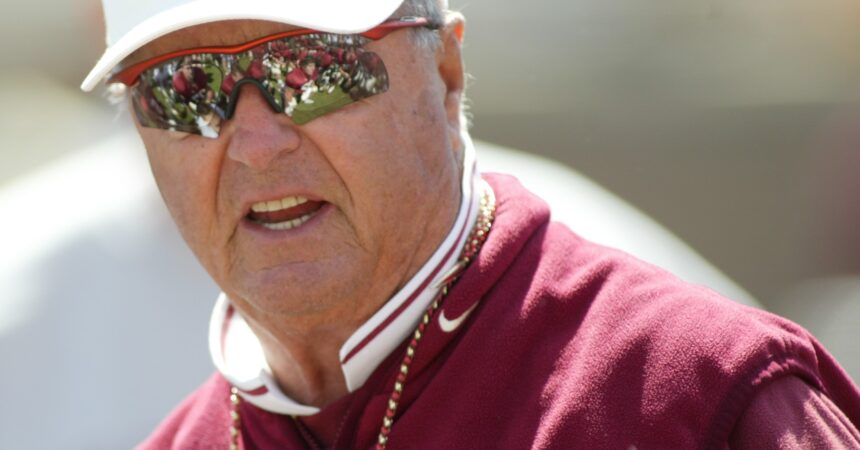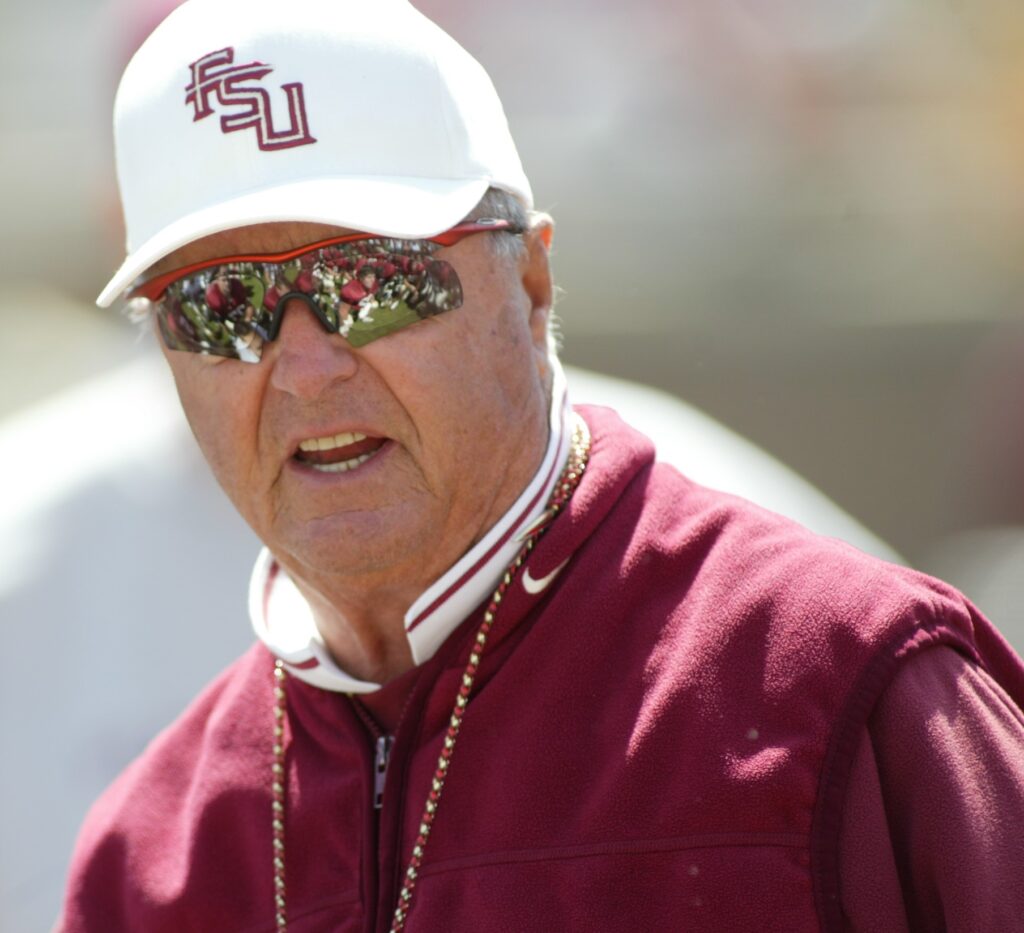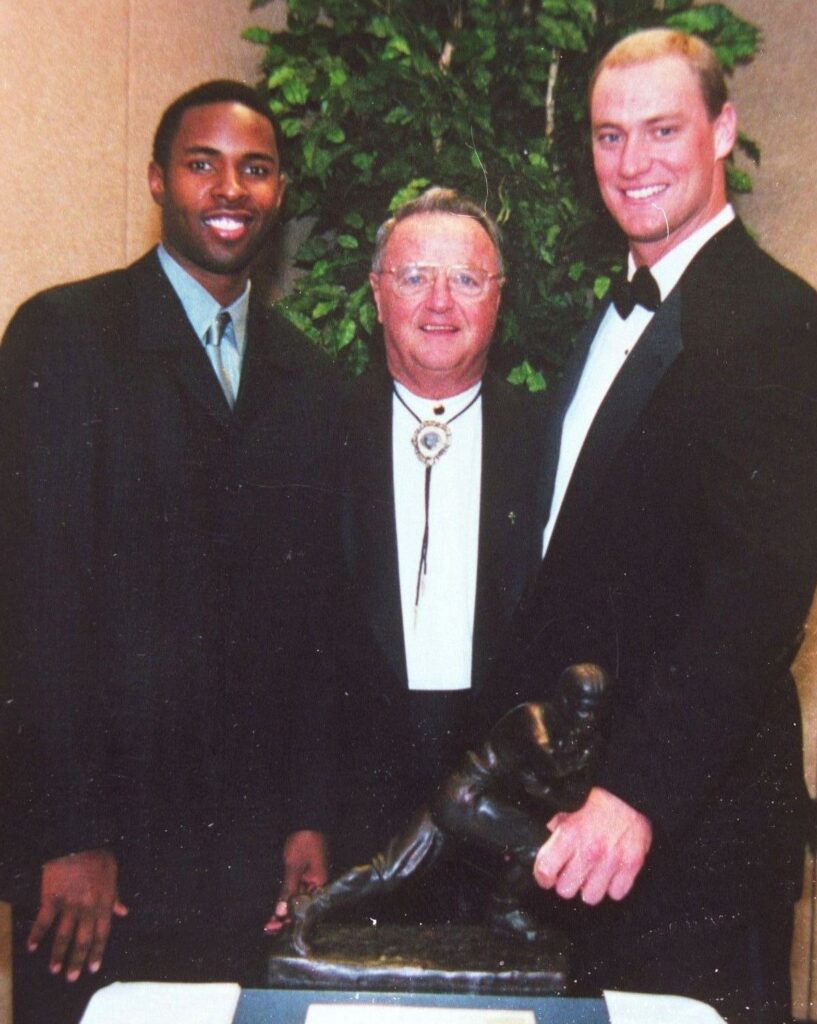
Christian faith, players’ success make Bowden’s legacy

Photo courtesy FSU athletics

Photo courtesy FSU athletics
By St. Clair Murraine
Outlook staff writer
No matter when they were on the football team during the Bobby Bowden era at Florida State University, players on the iconic coach’s roster witnessed two key reasons for his success.
Bowden wasn’t about winning more than he was about building character and encouraging his players to trust in a higher power. Those who knew Bowden during the 50 years that he coached, say he was one of the greatest minds on the sidelines.
Bowden, who spent the last 34 years of his coaching career at FSU, died Sunday. He was 91.
Bowden will lie in repose in the rotunda of the Capitol from 10 a.m. to 1 p.m. Friday and later in the Moore Athletic Center at FSU from 2 p.m. to 7 p.m. A public funeral will be held at the Civic Center, beginning at 11 a.m. Saturday.
Before a burial for only family members in Trussville, Ala., Bowden also will lie in repose Sunday at his alma mater, Samford University in Birmingham.
FSU announced his death almost two weeks after Bowden disclosed that he was suffering with a terminal ailment. His son, Terry, head coach at Louisiana Monroe, confirmed a few days later that Bowden was diagnosed with pancreatic cancer.
Bowden took a team that had won just four games before he took over the FSU program in 1976 to a 10-win season the second year. That set the stage for what would become a program that established the standard for major college football teams.
When Bowden retired in 2009, he was the second winningest coach all-time behind Joe Paterno, with a record of 377 wins amassed during the time he coached at West Virginia and later at FSU.
“Coach Bowden built a football dynasty and raised the national profile of Florida State University, and he did it with class and a sense of humor,” said FSU President John Thrasher. “While he leaves an incredible legacy as one of the best football coaches in collegiate history, he also will be remembered for his great faith, his love of family and his mentorship of countless young people. He will be profoundly missed.”
Gov. Ron DeSantis also reacted to news of Bowden’s death last Sunday. DeSantis presented the Florida Medal of Freedom to Bowden this past spring.
“Coach Bobby Bowden lived a remarkable life and leaves an incomparable legacy,” DeSantis said in a statement. “He created a dominating football program that produced championships and many great players.
“Coach Bowden also prepared his players to be leaders in their communities, and many have made a great impact across Florida and beyond. Most importantly, he lived his life guided by a strong faith in God, dedication to his family and service to his community. RIP to a truly great man and legendary Floridian, Coach Bobby Bowden.”
During the early 1990s, Bowden had a team that featured several Tallahassee natives in key roles on offense and defense. Corey Fuller, a defensive back out of Rickards High School, was one of those players.
“He believed everybody can be a Christian,” said Fuller, who played at FSU from 1990 to 1994. “The man he was is the person I’m trying to become — holistically, father, husband and as a coach.”
Fuller spent almost 10 years in the NFL after he was drafted by the Vikings in 1995. He is currently head coach at East Gadsden High School. Before that he also coached at Godby High School and Florida A&M, where he was interim head coach in 2014.
“I lead like Bobby Bowden and I coach like Mickey Andrews,” defensive coordinator under Bowden, Fuller said.
Bowden continued to be an influence for decades after he left FSU, said Fuller, who recalled having Bowden speak to the Rattlers.
“The time I signed in 1990 until that time when he came to Florida A&M will be two of the biggest moments — not even winning the national championship — because those two moments speak to who the man was,” Fuller said. “Winning was his cause but it wasn’t all about winning. His cause was winning souls for Christ. Job well done. Take your rest, coach.”
Bowden won two national championships at FSU, the first in 1993 when the team finished the season at 12-1. His 1999 team was undefeated in 12 games and clinched the second title with a Sugar Bowl victory over Virginia Tech.
Bowden, who was inducted into the College Football Hall of Fame in 2006, also led his teams to 12 Atlantic Coast Conference championships. More than two dozen of his players landed in the National Football League.
James Coleman, a former fullback who played for the coach who left a simple life in Alabama to become a larger-than-life figure in football, said Bowden had the coaching style of a CEO. Coleman, a product of Florida High, recalled how Bowden would hold his assistants responsible for fixing problems with their players.
But Bowden would eventually be there to “give that gentle nudge,” said Coleman. He said he always looked forward to the times when Bowden called his number in short-yardage situations.
“That’s just a special feeling to know I was like his secret weapon,” Coleman said. “It wasn’t just me (because) one of his favorite positions was at fullback. He knew we were going to run through somebody’s facemask.”
Through his coaching years, Bowden served on several civic and football-related organizations. They included being on the board of trustees for the American Football Coaches Association.
Joe Taylor, a College football hall of famer who coached at FAMU from 2008 to 2012, was a trustee with Bowden. When Taylor wrote his book titled “The making of a champion: success in an inconvenience” Bowden wrote the forward.
“A lot of times in those (trustees) meetings, I’m sitting right beside him because I’m trying to get some football tips,” Taylor said. “I’m listening to the meeting, but this is my opportunity to get with a very innovative mind and learn some football philosophy.”
One of Taylor’s biggest takeaways didn’t come from those meetings, though. It was in the details that Bowden outlined in an article that he titled “Button your chinstrap; one of us fixing to score.”
The gist of it was about how Bowden had the gumption to throw the ball when his team is on the minus-3 yard line. Taylor said it became a part of his play calling, with an efficiency rate of 80 percent.
“Nobody had enough nerves to do that, but he did it,” Taylor said.
Bowden became such a motivator that he was regularly asked to speak across the country. No matter the stage, his down-home humor would also come through.
For example, after winning his first national title, he appeared on the Jay Leno Show and said, as the title game was winding down “I’m thinking we are not going to win a national championship. I’ll never win one. It’s not for me. But the guy misses (a field goal attempt) and I found this out; wide left is better than wide right,” referring to his team losing two big games on wide right kicks.
Then at the White House visit after winning the national title, he said at the Rose Garden ceremony with former president Bill Clinton: “I was beginning to wonder if I’d ever come here after 41 years of coaching, which means I’ll be 106 the next time.”
The next time took just six years in 1999.
Messages of condolences poured in last Sunday. Here are some of them:
David Coburn, FSU director of athletics: “Mary and I are saddened by the loss of our beloved Coach Bowden, as are generations of Florida State fans and alumni. He impacted the lives of so many people and leaves a legacy at FSU and in college football that will be remembered forever. Our thoughts and prayers are with Ann and the entire Bowden family.”
Mike Novell, current FSU head football coach: “Coach Bowden was one of the greatest coaches ever, but more than that he was an incredible man. He was a special human being who earned an enduring legacy because of his wonderful heart, faith and values he lived. It was the honor of my lifetime to know him and beyond anything I could dream to have a relationship with him. My thoughts and prayers are with everyone who has been impacted by Coach Bowden and particularly with his wife Ann, their children, grandchildren, former players and coaches. The entire Florida State family is hurting right now at the loss of our program’s patriarch.”
Larry Robinson, president at FAMU: “The FAMU community joins Florida State University and the nation in mourning the loss of Coach Bobby Bowden. Coach Bowden built character and provided opportunities for young people to become their best. He inspired us all. His life and legacy are indeed worthy of celebrating.”
Al Lawson, Florida Congressman: “Over the course of his long and storied life and career, Coach Bobby Bowden made an immeasurable impact; not only on the Florida State University football program and its players, but also on our community at large. A two-time National Champion and 12-time ACC Champion, Coach Bowden was a leader whose commitment to excellence extended far beyond the football field. During his many impressive years at the helm of the Seminoles football team, Coach Bowden helped shape the lives of countless young athletes who played under him, and his loyalty and dedication to his family, friends and players set an example for all those who knew him. Many coaches can coach, but only a small number, like Bobby Bowden, can guide their student-athletes beyond the sports arena. I send my condolences to his family during this difficult time. I pray they find comfort in knowing that Coach Bowden was loved by so many across our nation, and his legacy will live on through each of us.”







